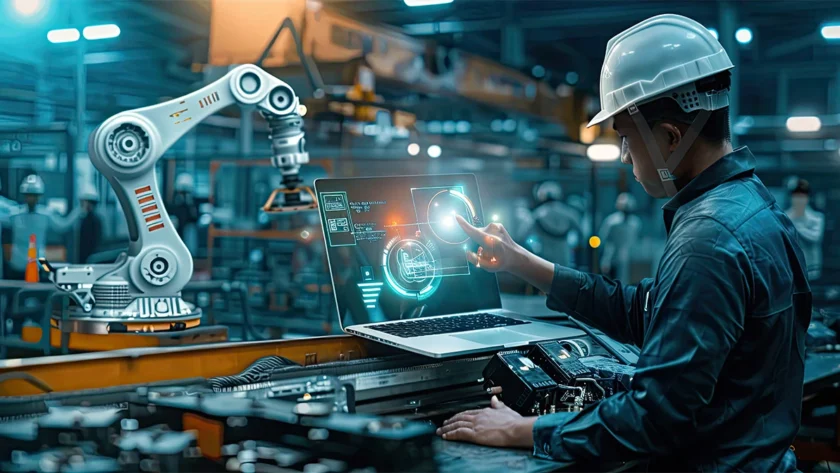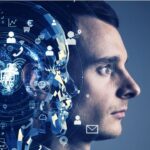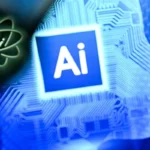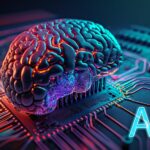Artificial Intelligence (AI) has emerged as one of the most transformative technologies of the 21st century. Once a concept confined to science fiction, AI is now a central force shaping various sectors, from healthcare and finance to retail and manufacturing. With its ability to process vast amounts of data, learn from patterns, and make autonomous decisions, AI is revolutionizing industries by enhancing efficiency, innovation, and productivity. This article explores how AI is revolutionizing industries and shaping the future across different domains, while also highlighting the opportunities, challenges, and implications it brings to society.
The Rise of Artificial Intelligence
AI can be defined as the simulation of human intelligence processes by machines, particularly computer systems. These processes include learning, reasoning, problem-solving, perception, and language understanding. Over the last few decades, AI has evolved from simple algorithms to sophisticated machine learning models, deep learning networks, and cognitive computing systems capable of performing complex tasks.
The growth of AI has been fueled by advances in data science, computational power, and algorithms. Today, AI is used to automate tasks, predict outcomes, enhance decision-making, and even create new products and services that were once unimaginable.
1. AI in Healthcare: Revolutionizing Patient Care and Treatment
In healthcare, AI is transforming the way medical professionals diagnose, treat, and manage diseases. With the ability to analyze vast amounts of patient data, AI systems can help doctors make more accurate diagnoses and predict patient outcomes with a level of precision that was previously not possible.
AI Applications in Healthcare:
- Medical Imaging: AI-powered image recognition tools can analyze medical images such as X-rays, MRIs, and CT scans to identify abnormalities, helping doctors detect conditions like cancer or heart disease earlier.
- Drug Discovery: AI is speeding up the drug discovery process by analyzing chemical compounds and predicting their efficacy. This accelerates the development of new medications, potentially saving lives and reducing the time and cost of bringing new drugs to market.
- Personalized Medicine: AI systems can analyze genetic data and medical history to create personalized treatment plans for patients, increasing the likelihood of successful outcomes.
- Virtual Health Assistants: AI-powered chatbots and virtual assistants can provide patients with round-the-clock medical advice, schedule appointments, and even monitor patient conditions remotely.
AI is not only improving the accuracy and efficiency of healthcare systems but is also making medical care more accessible, affordable, and personalized.
2. AI in Finance: Enhancing Decision-Making and Risk Management
The financial services industry has been one of the earliest adopters of AI, using the technology to enhance decision-making, improve customer service, and manage risk more effectively. AI in finance helps businesses and individuals make smarter financial decisions by providing insights based on data analysis, predictions, and automated systems.
AI Applications in Finance:
- Algorithmic Trading: AI-driven algorithms are used to analyze market data and execute trades faster and more efficiently than human traders. This allows for better timing and decision-making in trading, reducing the risk of financial loss.
- Fraud Detection: AI models can detect fraudulent activity by analyzing patterns in transaction data. These models can identify suspicious behavior in real-time and prevent fraud before it occurs.
- Personalized Banking: AI-powered chatbots and virtual assistants are helping banks provide personalized services to customers, including budgeting advice, loan recommendations, and account management support.
- Credit Scoring and Risk Assessment: AI can assess credit risk by analyzing a wide range of financial and behavioral data, leading to more accurate credit scores and fairer lending practices.
AI has made financial services more efficient, secure, and customer-centric, helping both businesses and consumers make more informed and timely decisions.
3. AI in Retail: Transforming Customer Experience and Operations
AI is significantly enhancing the retail industry by improving customer experience, streamlining supply chains, and personalizing product offerings. AI-powered technologies are transforming how retailers interact with customers and manage their operations.
AI Applications in Retail:
- Personalized Recommendations: Retailers like Amazon and Netflix use AI algorithms to analyze consumer behavior and recommend products or content tailored to individual preferences, enhancing the shopping experience.
- Chatbots and Virtual Assistants: AI chatbots help customers with product queries, order tracking, and personalized recommendations. These AI-driven systems provide instant support, improving customer service and satisfaction.
- Inventory Management: AI-powered tools can predict demand and optimize inventory management, reducing costs and minimizing waste. This leads to more efficient operations and better customer experiences.
- Visual Search and Augmented Reality: AI enables visual search technologies, where customers can upload images of products they are looking for, and the AI will find similar items. Augmented reality (AR) powered by AI also allows customers to try out products virtually before making a purchase.
AI is helping retailers offer seamless and highly personalized shopping experiences, ultimately increasing customer loyalty and driving sales.
4. AI in Manufacturing: Optimizing Production and Efficiency
In the manufacturing sector, AI is playing a crucial role in optimizing production lines, reducing waste, and improving quality control. Through the use of AI, manufacturers can enhance their operations, reduce costs, and improve product quality.
AI Applications in Manufacturing:
- Predictive Maintenance: AI-powered systems monitor machinery and equipment to predict when they might fail, allowing for preventive maintenance before costly breakdowns occur.
- Robotics and Automation: AI-driven robots are increasingly used to automate repetitive tasks on production lines, increasing efficiency and reducing labor costs. These robots can work alongside humans to perform tasks with higher precision and safety.
- Supply Chain Optimization: AI helps manufacturers optimize supply chains by predicting demand, managing inventories, and reducing production delays.
- Quality Control: AI-based image recognition tools can inspect products on production lines for defects, ensuring that only high-quality products reach consumers.
By integrating AI into manufacturing processes, companies can improve efficiency, reduce costs, and deliver high-quality products faster.
5. AI in Transportation: Enhancing Mobility and Safety
AI is revolutionizing the transportation industry by improving safety, efficiency, and the overall experience for travelers. From self-driving cars to AI-powered traffic management systems, the transportation sector is experiencing significant advancements.
AI Applications in Transportation:
- Self-Driving Vehicles: Autonomous vehicles are one of the most exciting developments in the transportation industry. Self-driving cars, buses, and trucks powered by AI have the potential to reduce traffic accidents, optimize routes, and lower transportation costs.
- Smart Traffic Systems: AI-based traffic management systems can analyze traffic flow in real-time, adjusting traffic lights and signals to reduce congestion and improve the flow of traffic.
- Predictive Maintenance for Vehicles: AI can monitor the condition of vehicles and predict when maintenance is required, reducing breakdowns and enhancing the safety of transportation systems.
- Fleet Management: AI helps businesses optimize fleet operations by providing real-time data on vehicle locations, fuel efficiency, and maintenance needs.
AI is making transportation systems smarter, safer, and more efficient, ultimately enhancing the movement of people and goods.
6. AI in Education: Personalizing Learning and Improving Outcomes
AI is transforming education by personalizing learning experiences and improving outcomes for students. From intelligent tutoring systems to AI-driven administrative tools, the use of AI in education is helping to create more tailored and effective learning environments.
AI Applications in Education:
- Personalized Learning: AI-driven platforms can analyze a student’s strengths and weaknesses and provide customized learning paths. This ensures that students can learn at their own pace and receive the support they need to succeed.
- AI Tutors: Virtual AI tutors provide students with real-time assistance and feedback, helping them understand difficult concepts and improve their skills.
- Automated Grading: AI tools can automate grading for assignments and tests, allowing teachers to spend more time focusing on individualized instruction and student support.
- Administrative Efficiency: AI can streamline administrative tasks, such as scheduling and resource management, freeing up educators to focus more on teaching.
AI is improving education by making learning more personalized, efficient, and accessible, ultimately helping students achieve their full potential.
7. AI in Energy: Driving Sustainability and Efficiency
AI is increasingly being used in the energy sector to optimize energy production, distribution, and consumption. Through the use of AI, energy companies can drive sustainability, reduce waste, and improve the overall efficiency of energy systems.
AI Applications in Energy:
- Smart Grids: AI-powered smart grids monitor and manage energy use in real time, optimizing the distribution of power and reducing energy waste.
- Energy Consumption Prediction: AI can predict energy demand, helping utility companies optimize their supply and reduce costs.
- Renewable Energy: AI helps in optimizing the generation and storage of renewable energy sources like wind and solar, ensuring a more sustainable and reliable energy system.
- Energy Efficiency in Buildings: AI-driven systems can optimize heating, cooling, and lighting in buildings, reducing energy consumption and costs.
AI is making the energy sector more sustainable and efficient, contributing to a greener and more sustainable future.
Frequently Asked Questions (FAQs)
- What industries are most impacted by AI? AI is revolutionizing multiple industries, including healthcare, finance, retail, manufacturing, transportation, education, and energy.
- How is AI helping healthcare? AI is improving diagnoses, enhancing drug discovery, enabling personalized treatment plans, and providing virtual health assistants for better patient care.
- Can AI replace human workers? While AI can automate certain tasks, it is more likely to enhance human work rather than replace it, allowing people to focus on higher-level decision-making and creativity.
- How does AI help in manufacturing? AI optimizes production lines, predicts equipment maintenance, improves quality control, and streamlines supply chain management.
- What are the ethical concerns with AI? Ethical concerns surrounding AI include bias in algorithms, job displacement, privacy issues, and the need for responsible development and regulation.
- What are AI-driven chatbots? AI-driven chatbots are virtual assistants that can interact with customers, answer queries, and perform tasks like booking appointments or making recommendations.
- How is AI transforming education? AI is personalizing learning experiences, automating administrative tasks, and providing real-time tutoring and feedback to students.
Conclusion
AI is rapidly transforming industries across the globe, driving innovation, enhancing productivity, and improving quality of life. From healthcare and finance to manufacturing, retail, and education, AI is reshaping how businesses operate and how individuals interact with technology. As AI continues to evolve, it holds the potential to revolutionize even more industries, creating new opportunities and challenges along the way.
Key Takeaways
- AI is driving innovation: AI is revolutionizing industries by automating processes, improving decision-making, and enabling new technologies and business models.
- AI enhances productivity: In sectors like healthcare, finance, and manufacturing, AI increases efficiency, reduces costs, and improves outcomes.
- AI is making industries more sustainable: AI is helping energy companies optimize production, reduce waste, and drive sustainability.
- AI creates new opportunities: By enhancing services and improving customer experiences, AI is creating new business models and job opportunities.
- Ethical considerations: As AI continues to evolve, it is important to address ethical concerns surrounding bias, privacy, and job displacement.
By leveraging AI, industries can unlock new potentials for growth and innovation, shaping a future that is more connected, efficient, and sustainable.




